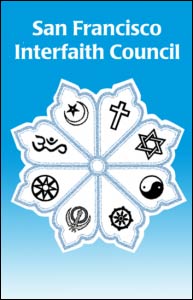By Michael G. Pappas
THE COMPLEX DYNAMICS AT THE LOCAL LEVEL
Imagine, for a moment, that your organization could boast as its constituents the 800 congregations in the City and County of San Francisco, their respective judicatories, sectarian schools and hospitals, along with the faith-based social service agencies that collectively provide the safety net for the City’s most vulnerable residents.
For more than 20 years, the SFIC has coordinated an annual Interfaith Winter Shelter Program, commencing the Sunday prior to Thanksgiving and running through late February. - Photo: SFIC
Imagine that your organization had the capacity to reach 3,200 e-subscribers with the click of a button and gather between 70-100 key faith and lay leaders monthly for breakfast to engage with noteworthy organizations and speakers.
Imagine what it would be like to oversee a shelter program where four congregations would host between 70 and 100 homeless men, nightly, over the span of four months, 35 congregations would commit to purchasing, preparing, and serving meals, with a waiting list of others, in the wings, anxious to volunteer.
Imagine being the “go-to” organization for every issue from disaster preparedness to gun violence prevention and possessing the ability to tap into and mobilize cadres of congregation volunteers for the sole purposes of celebrating religious diversity, building understanding, and serving the community.

Imagine having as your leverage and collateral 25 years of cultivated and trusted relationships and the ear and respect of those in decision-making authority. Collectively, such a profile would comprise a compelling narrative and position your organization as an attractive candidate in the eyes of prospective funders.
With a budget of just $240,000, humble office space, two full-time staff, an indefatigable 92 year-old founder and hard-working Board of Directors, the San Francisco Interfaith Council is perceived by many as a key stakeholder in the equation of numerous key social issues impacting our City.
Paying for it All
The greatest challenge to funding grassroots interfaith work like the San Francisco Interfaith Council is formulating a strategy that translates the value of its measurables into a language that engages and excites diverse constituencies of financial supporters. In our case, those constituencies include…
- CEOs of the faith-based social service agencies, whom we convene and on whose behalf we advocate. These have multimillion-dollar budgets and are engaged in the delivery of essential services. By bringing these key figures together the SFIC has played a significant role in illustrating their collective impact, advocating with a common voice during challenging budget battles, and telling the story of nonprofit displacement as a consequence of San Francisco’s newfound prosperity that has led to an affordability crisis.
- Members of the SFIC Board of Directors – As is an understanding for service on nonprofit boards, financial support and encouraging others to give is not only expected of Board members to keep the organization vital, but also symbolically sends an important message to other potential funders of the confidence of those entrusted with the fiduciary responsibility for the organization.
- Congregation leaders are direct beneficiaries of SFIC’s work, since the Council serves as a hub providing them with current resources, forums, and networking opportunities that open doors to volunteer opportunities and key services for their congregants. Equally, in numerous instances, the SFIC has become the lone advocate for the faith community on key issues that directly impact congregations and congregants.
- Foundations fund the largest percentage of support and require the greatest amount of time and energy. This is because foundation grants are primarily written to fund particular programs, are time sensitive, and activities must be monitored and reported upon to satisfy the stipulations of funding.
- Individual benefactors, some of whom only have a peripheral relationship with the organization (through interest in programs, relationships with other board members, or for other reasons), can be among the most generous donors. In many cases, their gifts are the most helpful because they are unrestricted.
- Religious judicatories that happen to be headquartered in our City also represent a large and important segment of interfaith funding. Their interest in interfaith work is equally significant, as they represent numerous congregations in their geographic region. The heads of judicatories are often called upon to participate in high-profile religious observances with their peers, and they add their names to statements responding to local and global crises and frequently represent their faith communities at key gatherings on important issues.
To keep each of these subgroups engaged in a city of savvy, ever-rapidly growing technology and social media requires one-on-one contact and deliberate relationship building. With so many interests competing for limited resources, nonprofits that take for granted the generosity of any or all the aforementioned sectors, do so at their own peril.
Likewise, informing and reminding these sectors, as well as the broader community, of the important interfaith work being undertaken is key to establishing an interfaith organization’s role in any community. The effectiveness of the San Francisco Interfaith Council’s ability to “tell its story” over a quarter of a century has positioned the Council as the “portal” through which public officials, governmental agencies, and nongovernmental organizations can communicate with San Francisco’s diverse faith community and visa versa. This unique and important niche has distinguished the organization and been a significant point in seeking funds.
Program fees have certainly been helpful in funding the organization, but do not represent a significant part of the budget. The SFIC’s main event of the year is the annual Interfaith Thanksgiving Prayer Breakfast. Arguably, this event is the sole opportunity to showcase the important contributions of the faith community to the greater good of the City. By intention, to make the event accessible to all, ticket prices have been kept at a minimum. The years when the event has reaped a profit is when a major sponsor has been engaged. Other programs that benefit the SFIC are the annual “Winterfaith Shelter Walk,” a five-mile hike around a local lake to benefit the Council’s winter shelter, along with a collection that is taken for the shelter at the annual “SFIC Interfaith Thanksgiving Service.”
Because of limited staff, a conscious decision was made by the Board of Directors early in the organization’s history not to seek or accept governmental funding for the work of the Council. The rationale for this decision was to protect the organization from becoming embroiled in bureaucratic red tape or becoming enslaved to providing direct services. Call it prophetic, this decision has freed the Council from both and allowed it to realize its core mission to bring people of different faiths together to celebrate our rich and diverse spiritual and religious traditions, build understanding, and serve our community.
In offering these humble thoughts, I realize that no two interfaith organizations are the same. The funding of interfaith organizations will vary from organization to organization, depending upon the reason for coming into existence, constituencies, geography, and history. Allow me to be so bold as to assert that the success of funding any interfaith organization is wholly dependent upon its focused commitment to its work, depth of the relationships of those undertaking that work, and ability to communicate the uniqueness of the work to those who can best help sustain it.
Common Ground
Before SFIC programs, the
following is read aloud:
“This is an interfaith community.
Whatever our individual belief, it can be
freely expressed here with no apologies.
If we are invited to offer a prayer in this
setting, it should be offered according to
the tradition with which we identify. If we
are invited to speak on a subject from the
perspective of our tradition, we are free to
do so without fear of offending those who
come from another tradition. We come
together as people of faith to learn
from each other that we might better
understand the multiplicity of faith
traditions in our city and in our world.”


